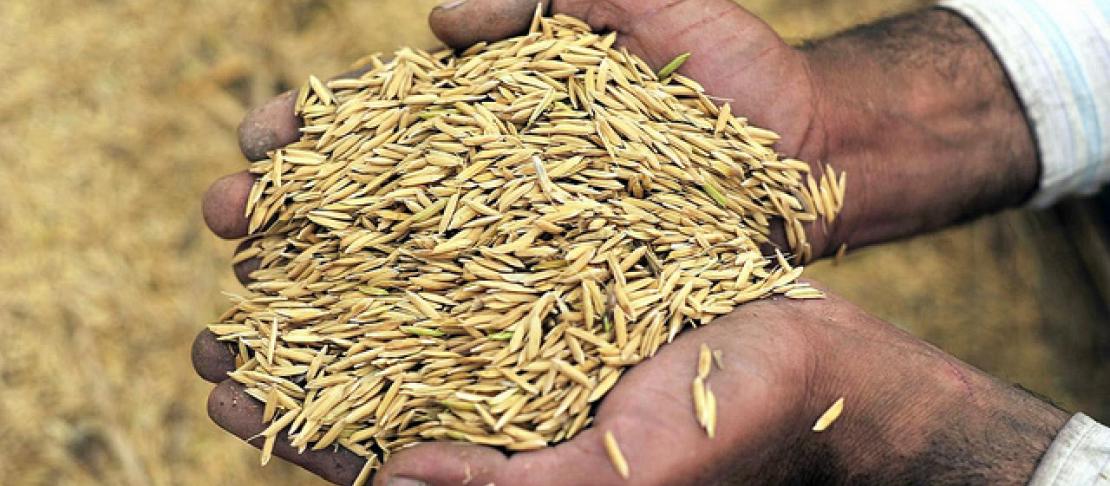Climate-smart insurance for weather risks: Enhancing farmers' adaptive capacity

Project description
This project aims to enhance farmers’ adaptive capacity by developing ‘Climate-Smart Insurance’ products that can complement policies promoting climate-smart agriculture (CSA). The resulting portfolio of sustainable climate-smart insurance products are currently being implemented in selected sites in India in collaboration with the Borlaug Institute for South Asia (BISA) and HDFC Ergo General Insurance Company Limited.
First, the researchers developed a theoretical model predicting when access to agricultural insurance and policies promoting CSA practices or technologies can reinforce each other. Second, the project is evaluating the take-up of these products using a small-scale pilot implementation in close coordination with existing CCAFS partners and ongoing CCAFS projects in India. As a cross-cutting third activity, CCAFS is engaging stakeholders as part of participatory product development using inception meetings, key informant interviews and focus group discussions. This research strives to ensure that these actors scale up the most promising products, enhancing adaptive capacity of a large population of farmers.
The pilot is motivated by a theoretical framework that identifies complementarities between a novel picture-based crop insurance product (PBI), which reduces basis risk and makes insurance more tangible for farmers by covering damage that is visible in pictures of farmers’ plots, and the promotion of conservation agriculture (CA). Theory predicts a natural complementarity: CA adoption reduces PBI premiums by protecting crops from extreme weather conditions without reducing yields in normal years, while PBI encourages CA adoption by protecting farmers from the perceived risk of trying out a new practice. In addition, insurance premium subsidies can be conditioned on CA adoption to provide farmers with direct incentives to try out the new practice and learn about its benefits from first-hand experience.
The pilot is testing these complementarities between CA and PBI in a pilot implementation with approximately 600 farmers in Punjab and Haryana, India. By 2019, this project aims to have reached 1-2 State Ministries of Agriculture in India, 1-2 private insurance providers, 1-2 agro-advisories, 20 farmers associations, and 10 specialized media outlets. These important and influential groups will apply the knowledge and evidence generated by this project to facilitate, promote or offer climate-smart insurance, which are expected to improve at least one million farmers’ adaptive capacity by 2025.
Specifically CCAFS aims to promote:
- Visibility and knowledge of climate-smart insurance: To create awareness of how climate-smart insurance can incentivize the adoption of CSA, and how CSA adoption in turn can increase demand for CSI. In addition, the research identifies the infrastructure that is necessary to create a sustainable market for these novel products. By 2019, 10 specialized media outlets will have covered the implications of this project for policies and practices around CSA and weather-related agricultural insurance.
- Institutional investments of at least 1 million USD in climate-smart insurance: At least 1-2 State Ministries of Agriculture will apply the knowledge and evidence generated to transform their insurance schemes into CSI schemes. We aim for them to integrate climate-smart insurance into their existing subsidized index insurance programs and increase public sector investments by at least USD 1 million in the infrastructure to make insurance more climate-smart.
Outputs
The most important milestone is the development of a theoretical framework, calibrated using historical data, agronomic data and farmers’ perceptions, as well as experiments on farmers’ preferences for risk reduction. This conceptual framework will serve as an input in all interactions with key stakeholders to meet the targeted project outcomes.
A second milestone will be the results from the pilot implementation, yielding evidence of potential complementarities between picture-based insurance products and policies promoting the adoption of conservation agriculture. As such, the pilot implementation will provide empirical evidence of what type of insurance products are climate-smart, complementing the theoretical framework.
To generate visibility around climate-smart insurance, CCAFS will develop two specialized media outputs: a CCAFS-IFPRI policy brief and a video to present key messages and results. All outputs will be available through a project’s website that will be linked to the Food Security Portal – India.
Partners
This project is led by the International Food Policy Research Institute (IFPRI), in collaboration with CCAFS, the Borlaug Institute for South Asia (BISA) and HDFC Ergo Insurance.
Gender
Involving women and marginalized groups is a key component of this project. The project aims to identify differences between men and women that can be crucial in the development, testing and implementation of an inclusive product that is accessible for both men and women as well as other marginalized groups. For instance, in product design, the project is exploring to what extent men and women in farming households value insurance differently, and whether they face different constraints in insurance adoption.
Further information
For further information, please contact Project Leader, Berber Kramer (IFPRI) at b.kramer@cgiar.org.